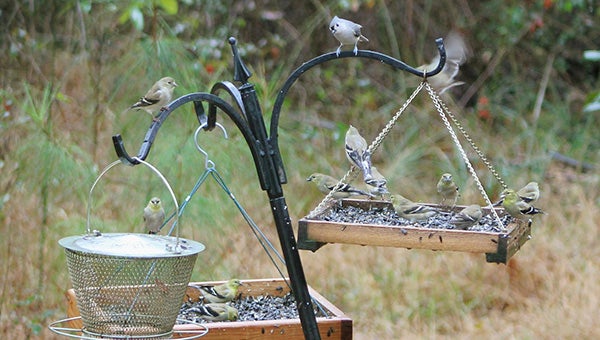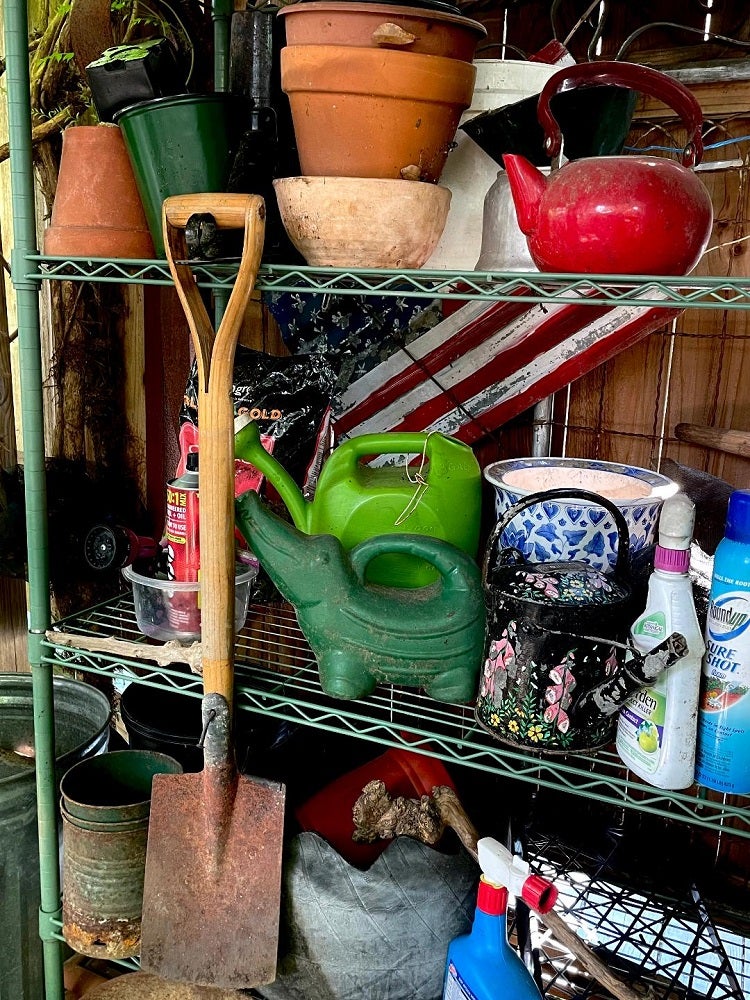Arboretum paths: Winter botany and wildlife
Published 7:00 am Wednesday, February 1, 2017

SHARED MEAL: These goldfinches and titmice are happily feasting on black oil sunflower seed, a highly preferred food source for winter birds.
Photo credit: Lana Gramlich
By Patricia R.
Drackett
Would you like to learn the secrets for identifying trees and shrubs in the winter months, when they are without the leaves that many of us rely on for clues? Come out to the Arboretum on Saturday morning for a fun and informative walk through the winter landscape with MSU Extension Forestry specialist Dr. Glenn Hughes.
On his field walk, Dr. Hughes will talk about how you can identify tree and shrub specimens in the winter by characteristics of their overall form as well as their twigs, buds, and bark.
Many of the woody plants you will encounter on a journey down the Arboretum pathways are ones that are beneficial to birds and other wildlife, and provide them with habitat, food sources, and places for nesting.
On Saturday afternoon, a children’s workshop will focus on creating pinecone ornaments to attract birds and other wildlife to your yard. Black oil sunflower seed will be one of the ingredients that will be used in the “bird butter” children will use to fill pinecones that can be hung from tree branches to provide a feast for birds and other critters.
The black oil sunflower seed may cost a bit more than a standard bird seed mix, but these seeds contain high amounts of protein, fiber, vitamin, and minerals, and are much more highly preferred and more beneficial to birds than the seed mixes that contain large amounts of millet and other “filler” seed.
You can find a wide variety of recipes for “bird butter” by searching the Internet. Generally, the mixture begins with a base of vegetable shortening, which is much better choice to use here in the South. Bird suet that uses a base of animal fats such as lard or beef fat for a binder can quickly go rancid in our warmer winters, and this can harm the feeding birds.
Birds such as chickadees, titmice, and woodpeckers are attracted to mixes that contain peanut butter and cornmeal. Species that prefer to eat fruits include cedar waxwings, robins, and bluebirds. Raisins, apples, cranberries, and other dried fruits can be added to the mixture, in addition to cracked sunflower seed, cracked corn, and oats. Dried fruit can also be soaked in water overnight and offered by itself to birds.
Although maintaining bird feeders and setting out occasional treats such as the backyard ornaments is fun to do, consider planting some native plant species that will provide wildlife with food sources year-round. Plants also provide the additional benefit of shelter and places for birds to nest and raise their young.
A great source for native plant species is the Crosby Arboretum’s quarterly plant sales. Our Arbor Day plant sale will be held Saturday, February 18, and will include many selections that are preferred by our local wildlife, such as hollies, viburnums, blueberries, mayhaw, persimmon, black cherry, wax myrtle, and southern crabapple.
Site admission is free on our plant sale days. If you have always wanted to check out the Arboretum, but have not done so yet, please don’t miss this excellent opportunity to visit.
For a list of native trees, shrubs, vines, and perennials that provide a variety of year-round food sources, visit the MSU Extension Service website at http://extension.msstate.edu/ and enter “attracting birds” in the search engine. Here, you will find information on the basic needs of birds, and design tips for creating a landscape to attract birds.
The Winter Botany field walk with Dr. Glenn Hughes will take place this Saturday, February 4 from 10:00 a.m. until noon, and is only $5 for non-members. The children’s workshop for Peanut Butter Pinecone Feeders is 1:00 to 2:00 p.m. All materials provided. Cost is $3 for members and $5 for non-members. Call 601-799-2311 to sign up for these programs.
Attend our Arbor Day Native Plant Sale on February 18 from 10:00 a.m. to 3:00 p.m.
More information on upcoming activities and events can be found on our website at www.crosbyarboretum.msstate.edu
Pat is the director of the Crosby Arboreteum and assistant extension professor of landscape architecture with the Mississippi State University Extension Service.


